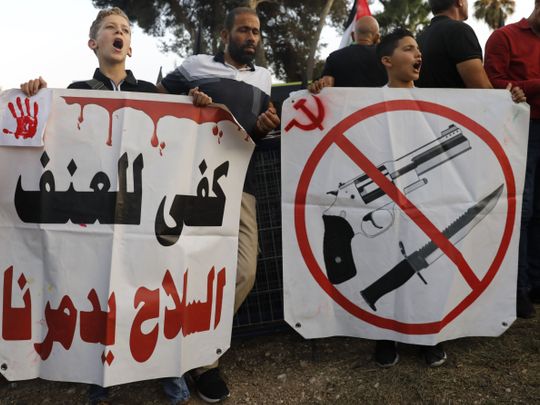
Um Al Fahm: On October 15, Mahmoud Moufid Igbariyya left a mosque following evening prayers, entered his car and was fatally shot seconds later by a passing vehicle.
The 35-year-old resident of the 1948 area town of Umm al-Fahm became the 75th murder victim this year.
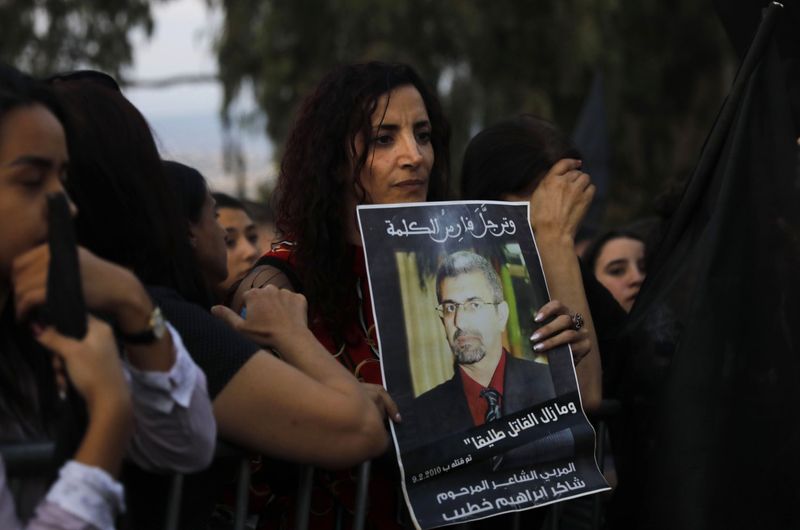
1948 areas refer to land Palestinians still live on land in which the Israeli state was created in 1948.
Palestinian citizens of Israel constitute only a fifth of the population but make up 80 per cent of those killed in 2019.
Israel refers to them as “Israeli Arabs”.
A wave of demonstrations has swept Israel in recent weeks demanding greater police engagement inside Palestinian communities.
In response, Israeli police have stepped up operations, but the problem goes beyond a pattern of police negligence.
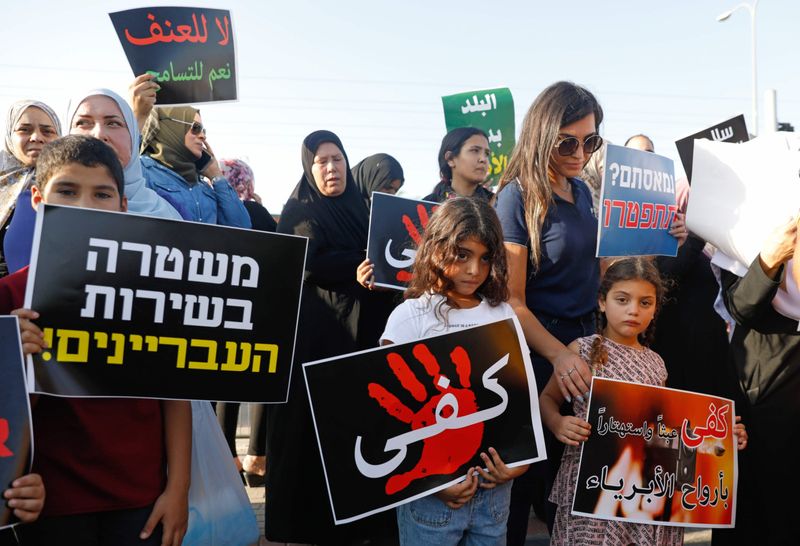
“This is a result of years of social, economic discrimination against the Palestinian community within Israel and the lack of educational and welfare services,” Arab-Israeli lawmaker Yousef Jabareen said.
This is a result of years of social, economic discrimination against the Palestinian community within Israel and the lack of educational and welfare services.
The rising murder rate stems from an increase in organized crime inside Palestinian communities.
Israeli officials claim Palestinian society is inherently violent compared to Jewish communities, but the lack of economic opportunities seems to be pushing Palestinian citizens of Israel toward a life of crime.
“These organizations are actually taking advantage of the fact that in many Palestinian towns there’s no employment and the unemployed, young Palestinians find easy money working for these organizations,” Raja Zaatry, spokesperson for the High Follow-Up Committee for Arab Citizens of Israel, said.
In Israel, nearly 50 per cent of Palestinian households live below the poverty line compared to roughly 13 per cent of Jewish families, according to a recent study from the Israeli research institute Adva Center.
50 %
Palestinians in Israel live below poverty line13 %
Jews in Israel live below poverty lineBleak job prospects and an abundance of illegal weapons creates a deadly combination for Palestinian communities.
Israel police statistics estimate around 400,000 illegal weapons circulating the streets, mostly in Arab sectors.
“We are only two million, which means a quarter of us are armed,” Raya Mana’a, an activist from the Arab town of Majd al-Kurum, said.
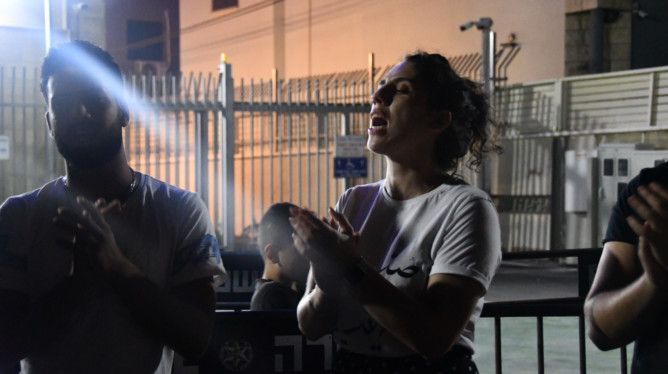
Israel police spokesperson, Micky Rosenfeld, said the weapons are being smuggled from the occupied West Bank and Bedouin communities.
But Raya countered this notion, saying the flood of weapons is coming from the Israeli army.
Citing a report from Israeli television channel KAN, Raya noted that 75 per cent of weapons involved in crimes inside Palestinian communities comes from the Israel Defense Forces.
75 %
weapons come from Israeli armyThe report mentioned some soldiers are even trafficking these weapons.
“They know we’re not going to point them toward the IDF or police. They know very well that we’re going to point these weapons towards each other,” Raya said.
MK Jabareen confirmed this information with a state comptroller report detailing an increase in stolen IDF weapons and an insufficient military response to the problem.
Raya lost her two cousins – brothers Ahmad and Khalil Mana’a – to gun violence earlier this month. Since that fateful day, she has demonstrated outside the Majd al-Kurum police station every night.
“We’ve started protesting, but the killing is continuing,” Raya said.
Majority of cases closed
From 2014 to 2017, 70 per cent of cases where Palestinian citizens of Israel were killed were closed – including Raya’s other cousin, Hiba Mana’a, who was fatally shot in 2017.
Raya said Israel’s intelligence agency, Mossad, is “one of the strongest in the world” so she doesn’t believe when authorities say they don’t have enough information.
While police increase the number of officers inside Palestinian communities, Raya said the additional forces aren’t catching criminals but instead targeting demonstrators.
According to Raya, two protesters were questioned, with one having their home searched.
Two received phone calls from an intelligence officer, and another activist was arrested and got five days of home detention along with a 15-day restraining order from the police station.
Raya’s sister, Aya Mana’a, fears more police just means they’ll go after protesters.
“They will come to activists’ houses in order to make their lives hell and prevent them from raising their voice,” Aya said.
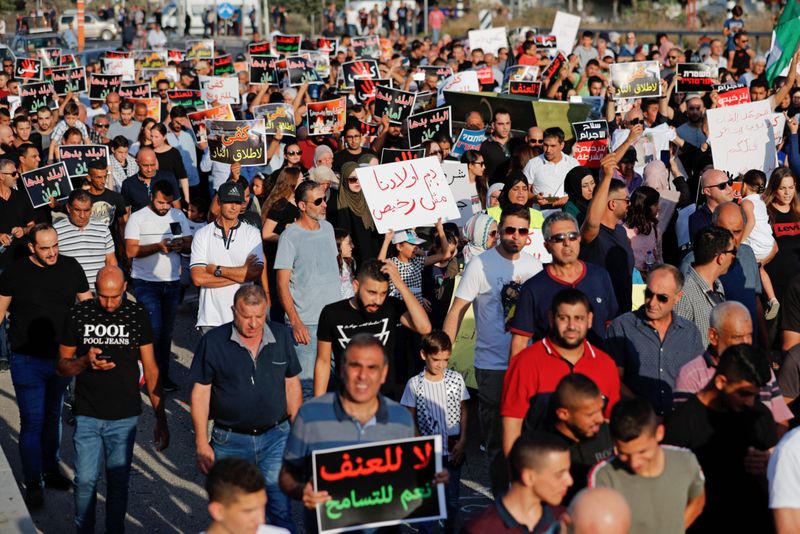
MK Jabareen said he is receiving complaints from Arab localities about the escalated police presence only going after minor incidents – like traffic fines.
While both police officials and Arab leaders agree extra policing won’t eradicate violence fully, they differ on what the solution should be.
Police spokesperson Rosenfeld thinks Arab officials need to better communicate to the public what constitutes breaking the law. But Zaatry from the High Follow-Up Committee thinks the government needs to act.
“It is not only an issue of how many policemen are inside, but we demand a government decision in order to fight the crime organizations,” Zaatry said.
“It’s a matter of political will and how much the government sees the issue as a priority.”
Zaatry feels mounting public pressure is helping the government prioritize violence. But for Aya, protesting for the basic right to live is distracting from other issues.
“This is part of the dark place the government wanted us to be in. No one is going to be thinking of cultural and educational rights when he’s not safe.”
-Rachel is a freelance journalist based in Palestine











